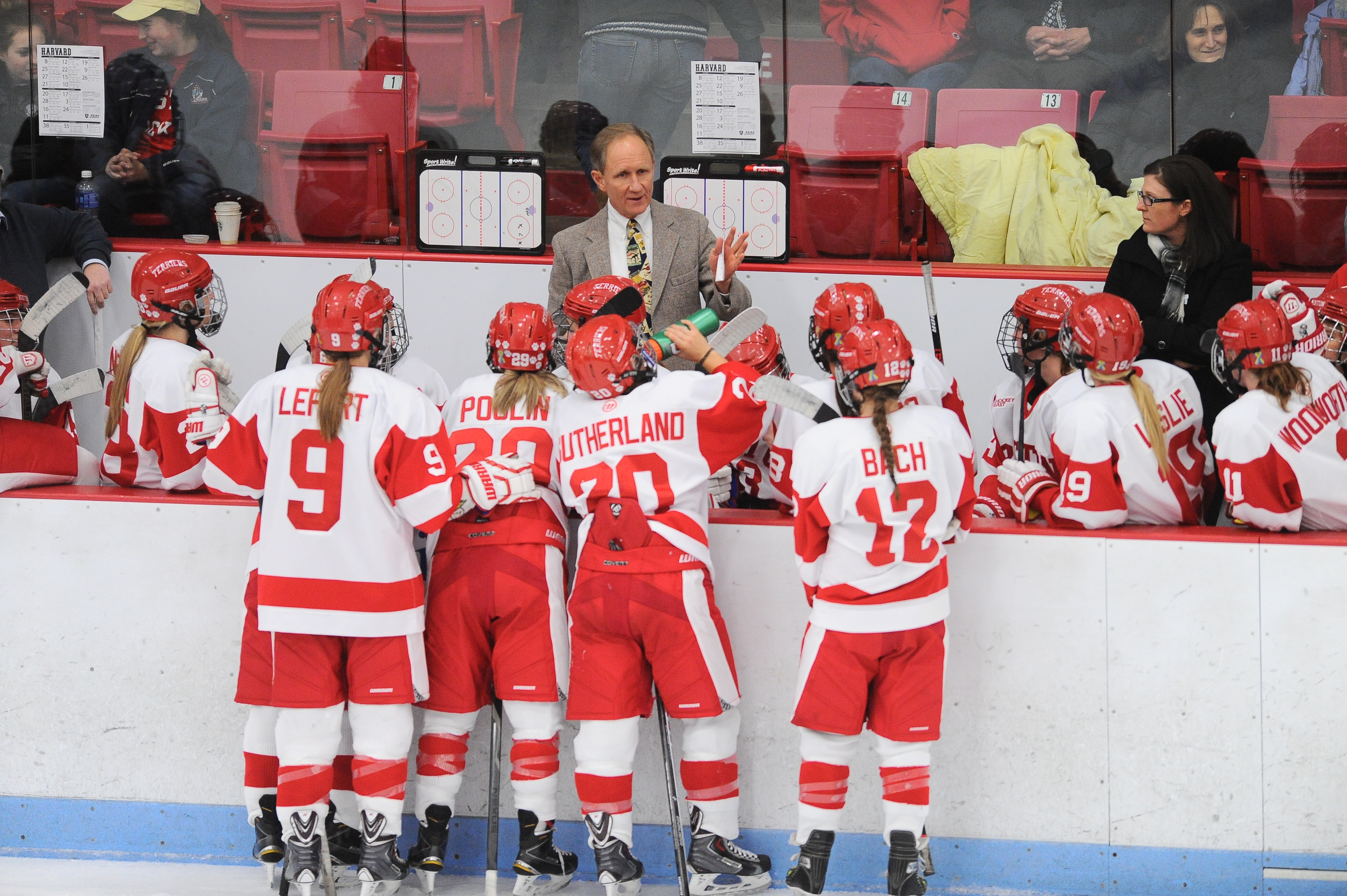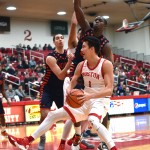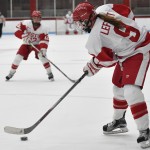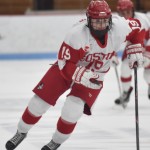[rawr]
[/rawr]
Five national championships, 22 Frozen Fours, 30 Beanpot titles — the Boston University men’s ice hockey program boasts one of the most decorated histories in all of college hockey.
A select group of 11 men have been given the opportunity to call themselves the head coach of BU’s sacred athletic institution, the last of which being the legendary Jack Parker. Parker, the winner of 897 Division I contests. Parker, the guide for over three dozen All-Americans. Parker, the engineer behind the premier program of the late-20th century.
When Parker retired following 2012-13 season, he left behind larger-than-life shoes to fill. As then-BU Director of Athletics Mike Lynch searched for his replacement, he came across a familiar name. Once a shortlist was compiled, Lynch reached out to those who had made the cut, planning to schedule interviews. Only, one of the candidates gave him a less-than-conventional response.
“You’ve got the wrong guy,” Brian Durocher told him.
For someone who had spent the better part of his life within the realm of BU hockey, this reply seemed unthinkable. However, for someone who already had his dream job, it was a foregone conclusion.
A native of Longmeadow, Durocher was destined for a coaching career from a young age. His great-uncle, Hall of Famer Leo Durocher, retired with the fifth-most victories in Major League Baseball history. Pedigree aside, Durocher was a student of athletics his entire life.
“I would always go across the street, because I grew up right across from a playground,” he said, “… and I used to always go over and sit and watch the kids that were about five years older than me and hope they would let me go out and throw a pass once, or catch a pass from them or take a swing in baseball. I always kind of studied the game and watched what they were doing.”
Durocher took his practiced eye to BU hockey in 1974, where he manned the pipes for some of Parker’s earliest teams. During his freshman campaign, he sported a 17-2-1 record, highlighting a season in which BU finished 26-5-1. By his senior season, he co-captained the team with U.S. Olympian Jack O’Callahan and led the Terriers to their highest winning percentage in school history as well as the program’s third national title.
After eight days of calling himself a professional hockey player, Durocher hung up his skates and donned a whistle, beginning his coaching career as an assistant with the American International College in 1978. Two years later, he reunited with Parker, taking an assistant coaching position at his alma mater.
“When I was a player for him, he kind of sensed that I was a student of the game, that I liked the game,” Durocher said of his early relationship with Parker. “When I wasn’t playing here … I was always involved. I was always thinking, asking questions, I was trying to be a good person, so maybe he saw that.”
While apprenticing under Parker, Durocher developed a feel for the practicalities of the profession: recruiting, organizing practices and training schedules, understanding hockey strategy. His initial five-year stint at BU “put foundations in place” for his continued coaching education.
Durocher’s career grew clearer when he joined Terry Slater as an assistant coach at Colgate University in 1985. Slater, a legendary coach in his own right, had begun to garner attention for his rejuvenation of the Raiders’ hockey tradition.
Having the chance to learn under both Slater and Parker proved invaluable for Durocher, as the two icons taught him two opposite, yet equally important, aspects of coaching.
“They were both very successful coaches, but Jack was a real X’s and O’s guy, where Terry was the master psychologist,” Durocher said.
Independence defined Durocher’s time at Colgate. Without other assistant coaches to help shoulder the burden of running a team, Durocher was left with a lion’s share of the day-to-day responsibilities. Based on workload alone, Durocher cites his time with Slater and the Raiders as the point where he grew the most as a coach.
“Having to do all the recruiting basically and still be a part of the games and practices as much as I could be, it was a big learning lesson,” he said. “I had to either sink or swim and we had an awful lot of success. It was probably the best seven-year run they had there in the history of the program. I don’t take, by any means, all the credit or a ton of the credit, but I take some of it and that was important.”
The Raiders reached new heights in 1989-90 when Durocher helped Slater’s bunch to a 31-6-1 record, an Eastern Conference Athletic College title, a Frozen Four knockout of BU and a berth in the national championship game.
However, shortly after Colgate’s magical run, tragedy struck, as Slater passed away during the middle of the 1991-92 season at the age of 54.
For Durocher, Slater’s death represented a troubling time in more ways than one. While he understandably felt grief and anguish over the loss of his longtime mentor and friend, he also took over as interim head coach in Slater’s wake.
Durocher led the Raiders to a 13-10 record and a berth in the ECAC Tournament, but they were dispatched in the first round, concluding a tumultuous season. Hoping for the best, Durocher continued interim head coaching responsibilities during the offseason. Yet Colgate eventually rejected his bid for the full-time job.
“I’m 14 or 15 years into my coaching and I almost quit coaching because I didn’t get the job at Colgate,” Durocher said. “It was a learning experience where I could reflect back and know that I did some things well and I did some things that I wish I did differently.”
Following his dismissal from Colgate, Durocher joined the staff at Brown University before resuming his tenure at BU in 1996 as an associate head coach under Parker.
Durocher oversaw six Beanpot championships and one Hockey East Tournament title in eight years during his third stint on Commonwealth Avenue. But it would be a small piece of 20-year-old advice that Parker once gave him that would wind up defining his coaching career.
“He recommended that I expand my horizons,” Durocher remembered from a conversation he had had with Parker in 1985.
Durocher did just that when he took the reins of the brand new BU women’s ice hockey program on June 3, 2004. He signed his first head coaching contract with Parker’s blessing and set out to build a program from the ground up.
“[Parker] and Mike Lynch and other people here had faith in me when we started this women’s program,” Durocher said. “‘Hey, here’s the right guy to get it going because he’s been in coaching and he’s also a Boston University person who knows people, who knows the landscape.’ When you’re starting that’s very helpful and very important, not just knowing the hockey traditions, but knowing the school.”
The first few years were anything but easy for Durocher and the Terriers, as the program’s growing pains outweighed the rewards. BU went 12-17-4 in its inaugural season, finishing sixth in Hockey East. Over the next two years, the Terriers compiled a combined 34-29-6 record as players gradually grew accustomed to Durocher’s system.
Though Durocher had gained roughly four months of head coaching experience as an interim at Colgate, he was far from established when he took the BU job. He was constantly learning the ins and outs of the day-to-day operation of the team as much as the next rookie head coach. Yet, his time with the Raiders influenced the way he guided his young players.
“I learned an awful lot [at Colgate],” Durocher said. “And when they didn’t give me that opportunity, I still was able to look back on that when this program started — of how things were done, what I did and particularly the head coaching segment of it. I had to say, ‘Ok, what things were good and what things could I have done better. Let’s make sure that I put those in place or act on those things in the best order possible at BU.’”
As the number of available scholarships increased and he and his assistants, Kerstin Matthews and Erica Silver, instilled a culture around the program, wins soon followed. By 2010, Durocher’s bunch had taken the next step, putting together consecutive winning seasons for the first time in team history and taking home their first Hockey East championship.
One year later, the Terriers made a giant leap. After registering their first-ever 20-win campaign with a 27-7-4 mark, they advanced to the NCAA Tournament as an at-large bid, where they would finish as the NCAA runners-up to No. 1 University of Wisconsin.
Since making a national splash, BU has remained one of the premier programs in the country. The Terriers have captured four consecutive Hockey East titles and five of the last six dating back to the 2009-10 season. They earned another national championship game berth in 2013, this time falling at the hands of U.S. Olympian Amanda Kessel’s University of Minnesota team.
“The biggest thing that I’m shocked about is that we’ve been able to win five out of the last six championships,” Durocher said. “It certainly isn’t me, it’s the kids that have played here. We were fortunate to have really good players.”
Indeed, Durocher has seen some of the most prolific icons in women’s hockey walk through the doors of Walter Brown Arena. From Tara Watchorn to Jillian Kirchner, Holly Lorms to Lauren Cherewyk, Kasey Boucher to Marie-Philip Poulin, he’s coached a number of special talents throughout his tenure.
But for him, every single one of his players represents something more than just a name on a roster.
“To me, it’s a great honor to have coached everybody that’s come through the doors here,” he said. “It’s an unbelievable honor and it’s terribly exciting because they’re talented kids who play the game at a super high level.
“It’s something that I’ll always cherish and will always try to keep in touch with these kids because they’re part of my family. I have an immediate family at home of three daughters and a wife, but I have an extended family of everybody that I’ve coached. Certainly all the BU women, they’re the ones that have been the most recent of my life and the ones that I’ve been head coach for.”
As much as his players mean to him, Durocher means just as much to them. He represents more than a coach. He’s a mentor, and an important cog in their development, not only as players, but also as people.
“He really cares about us,” said junior forward Maddie Elia. “He always puts us first and that’s really important, so we’re comfortable playing for him and we always listen and respect him.”
“He’s a very dedicated coach,” echoed junior goaltender Victoria Hanson. “He knows all of us, all of our strengths, our weaknesses and what we’re capable of. … He has a great repertoire, he’s been at BU for years so having that behind him and going to BU as well, he has the pride that comes with it. He coaches with all his heart each game. He trusts us to go out and play our best and play our game and that works for our team.”
A thread in the fabric of BU hockey for more than 40 years, Durocher has built a legacy that was both expected, yet completely unforeseen. In 1996, when he stepped foot on the Charles River Campus for the third time in as many decades, his path seemed clear.
Now, 19 years and 210 wins later, Durocher is still the fixture of BU hockey he was always meant to be. Except, his name doesn’t follow Parker’s in the record books.
It stands alone.
“When I talk about getting this job, talk about hitting a home run, well it’s been a grand slam,” Durocher said. “… I didn’t think 30 years ago, or 25, or 20 years ago that this was going to be, potentially, my last job in the game. But each day, each week, each year that I’ve been in it, I’m pretty certain it’s where I’m going to stop coaching.”
And he wouldn’t have it any other way.
Justin is a former Sports Editor for the Daily Free Press. In the past, he has covered the BU field hockey, men's basketball, women's hockey and women's lacrosse teams. Justin has interned at WEEI.com and serves as Editor-In-Chief of the Cleveland sports blog, Straight Down Euclid. Follow him on Twitter: @just_a_pal






I was recruited by BD in the early ’80s and went on to play at BU while he was an assistant coach for coach Parker. BD is such a character guy – devoted, caring, capable and simply a “nice guy”. I am not surprised at all by his success. I am fond of him and happy to be part of that BU family that he speaks about. The women’s program could not have selected a better person to lead them.
Cesare